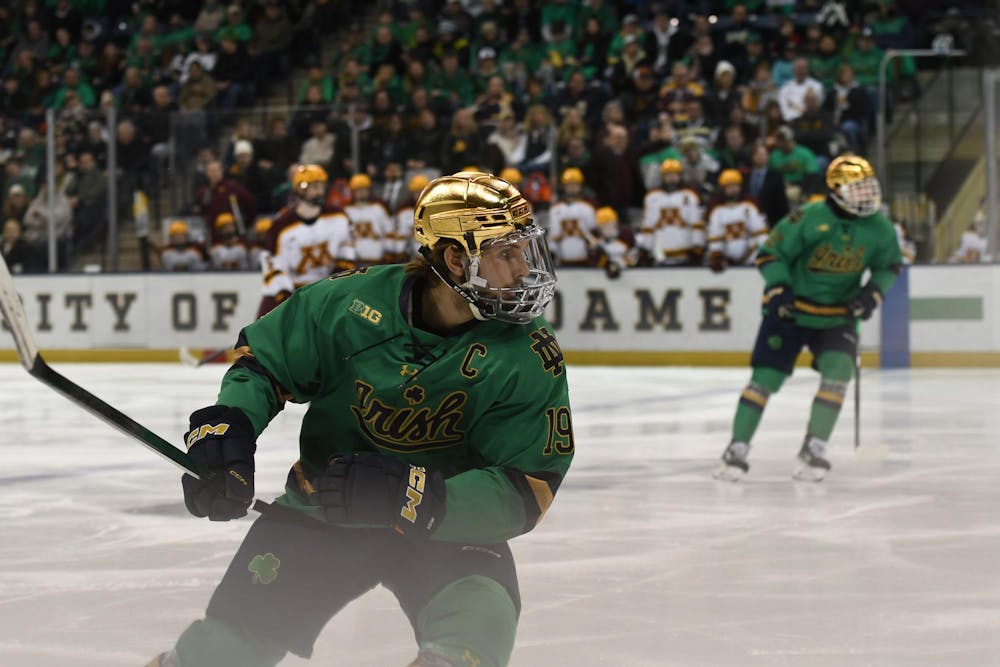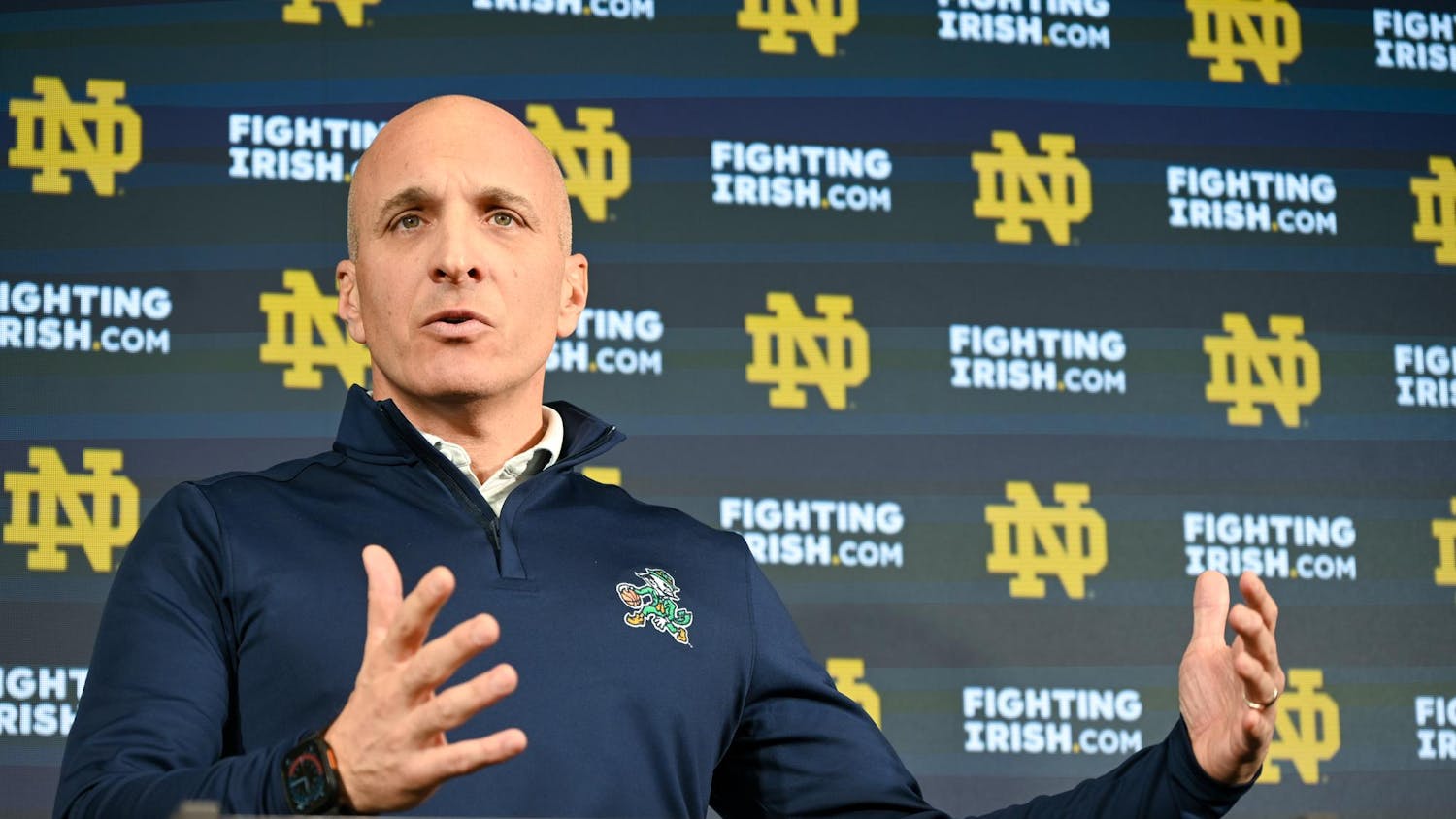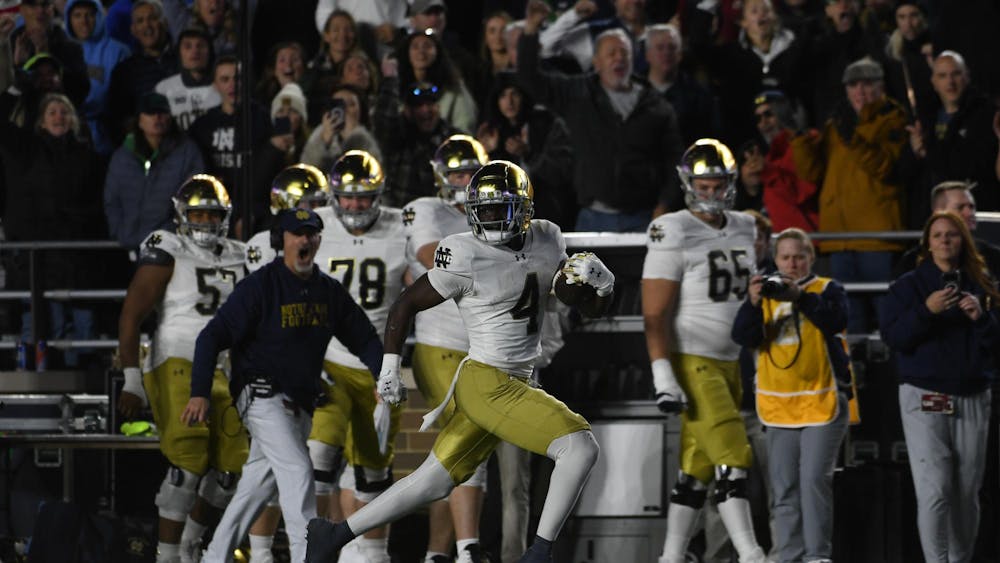Notre Dame hockey wrapped up its season two weeks ago with a Big Ten quarterfinal loss at Michigan. Andrew McGuinness, Ryan Murphy and Tyler Reidy of The Observer’s hockey beat break down the team’s past, present and future.
How would you summarize the 2023-24 edition of Notre Dame hockey?
Andrew McGuinness, Senior Sports Writer: Tantalizing. This team had a real chance to go on a run around the beginning of February when it swept Penn State and took the first game against Michigan State. Freshmen forwards Danny Nelson and Cole Knuble were at the height of their growth, giving the Irish the formidable one-two punch down the middle they previously lacked.
It will be exciting to see how they continue to grow going forward. But everyone knew they were only to get one season alongside Landon Slaggert, Drew Bavaro and the brick wall that is Ryan Bischel. That group feels strong enough to be the core of a championship contender. The timelines just don’t align quite right, as the final month of the season showed.
Tyler Reidy, Sports Editor: Ryan said it to me so astutely during the final Minnesota series — “Life is a Highway” with 2023-24 Notre Dame hockey. He was right. Unlike last year’s team, marred by chronic series splitting, this year’s Irish were just too streaky for their own good. Sticking with the analogy, they either breezed through each intersection or hit every red light. Ultimately, the losing skids — including the one that ended this season — outweighed the winning accelerations.
Ryan Murphy, Associate Sports Editor: I have to say, I do almost always love that song “Life is a Highway.” As an analogy for this year’s season, though, maybe it’s slightly more bittersweet than usual.
I was rifling through my notes for this season to get ready for this roundtable and found a note I wrote earlier in the season that turned out to be ominously true: with youth in the lineup, there will be very high highs and very low lows. The highs this season were memorable: 6-1 home wins over Michigan and Minnesota come first to mind. But the lows were lower than at any point last season: an 8-2 home loss to Boston University, a 6-1 drubbing to Boston College, and the bottom falling out during a 1-8 end to the season. Ultimately, inconsistencies (as well as a fair share of injuries) did the Irish in.
What ultimately kept the team short of having any postseason success?
McGuinness: The lack of secondary scoring. Notre Dame’s seven goals in the Big Ten Tournament came from three different players. With Danny Nelson out for the series due to injury, the Irish were clearly lacking down the middle. It showed when Michigan was able to tighten up in the big moments, keeping the Irish off the board in the third period of both games.
Murphy: A lack of discipline may not be the ultimate reason, but it’s certainly a factor. Over the course of their last 10 games, Notre Dame were whistled for no fewer than six 5-minute major penalties and six 10-minute game misconducts. Now, some of those occurred on the same infraction, but the point stands — that’s far too many. The Irish have long prided themselves on discipline, but they finished the season taking 12.3 penalty minutes per game, 14th most in the country. That’s no way to have postseason success: 13 of the top 15 teams in penalty minutes (Notre Dame included) will not qualify for the NCAA Tournament.
Reidy: An inability to win away from Compton Family Ice Arena. Including the postseason, Notre Dame went 1-12-0 on the road from November 18 onward. Overall, the Irish went 2-11-2 outside South Bend. Those records are simply incompatible with a legitimate contender, and, come Sunday, they will give the selection committee no reason to see the Irish as a team that can win at neutral sites in the NCAA Tournament. The last three weeks of the season encapsulated Notre Dame’s road struggles, with the Irish unable to win one game at Michigan with home ice on the line before going 0-2 there in the Big Ten quarterfinals.
Who wins your team awards (MVP, Rookie of the Year, Most Improved Player)?
McGuinness: MVP has to go to Ryan Bischel, even factoring in a second straight postseason where he was merely human. Notre Dame struggled offensively all season and were consistently outshot for the second straight season. But Bischel once again dragged them to the fringes of the NCAA Tournament. Irish fans may learn the hard way how big of a luxury he was until next season when someone isn’t stopping 30 to 40 shots on a nightly basis.
Reidy: Landon Slaggert deserves plenty of credit with a 20-goal season, but Ryan Bischel earned himself MVP honors. For a young team like Notre Dame, you can’t ask for more than a goaltender who started every game and played to a .924 save percentage against unrelentingly stiff competition.
Danny Nelson is a fairly easy choice for Rookie of the Year. Despite having different linemates seemingly every series, Nelson produced a steady stream of points all season, ending with 23 on nine goals and 14 assists. He also ranked as one of the Big Ten’s best face-off men with a win percentage of 59.0. Cole Knuble deserves recognition here too, as he gave Nelson a run for his money with 10 points in the season’s final 11 games.
Michael Mastrodomenico takes home my Most Improved Player award. He spent his freshman season in and out of the lineup as a sixth or seventh defenseman but became a major factor this season. As a top-four blue line, Mastrodomenico emerged as Notre Dame’s most physical player while avoiding the major penalties that plagued other Irish defensemen. Heading into year three, the Quebec native can hold his own against the nation’s best.
Murphy: We are unanimous with our choice for MVP. Ryan Bischel didn’t repeat as Big Ten goaltender of the year — that honor went to Wisconsin’s Kyle McLellan — but he’s again a semifinalist for the Richter Award. For the second year in a row, he finished the season with the most saves on any goalie in the country. With Notre Dame's strength of schedule (second-best nationally), the Richter committee should give Bischel a good, long look for the award.
I’ll go a bit unconventional for my Rookie of the Year pick – it’s hard to argue against Knuble and Nelson, but I also think defenseman Paul Fischer also deserves some credit. It’s not easy to jump into the top six as a freshman, and Fischer played a pivotal role in Notre Dame’s defense this year. He spent some time on the power play as well and is going to be an important cornerstone on Notre Dame’s blue line of the future.
As for Most Improved, it might sound a bit silly, but I’m taking Landon Slaggert. It’s no secret that, after breaking out with 26 points his sophomore year, Slaggert was disappointed in his junior season last year. This season, though, Slaggert was a changed player. With a little more rest and rehabilitation under his belt, Landon truly came into his own this year. He played like the powerful forward he can be, notched 31 points and showed the capability to take over a game when he wanted to.
Who from this year’s team are you most excited to see at the next level?
McGuinness: True talent-wise, Landon Slaggert is probably going to be a third-liner in the NHL. However, he has the chance to play much higher in the lineup. Everything about Slaggert’s game screams excellent support piece for a star or two playing in the top six. He’s a good skater and isn’t afraid to go into the corners, where he’s both tenacious and smart enough to win puck battles. And he can more than hold his own offensively, as his 20 goals this season (which put him in the top 20 nationally) indicate. I’m not saying he’s going to be a 40-goal scorer like Chris Kunitz alongside Sidney Crosby or Zach Hyman with Connor McDavid. But he seems like he can thrive in a similar role.
Murphy: I’m also excited to watch Landon at the next level. This is probably the easiest answer because he’s already in the NHL! He’ll need to work on finishing those breakaway opportunities if and when he gets them – those seemed to be his Achilles heel this season. Adapting to the lengthy 82-game NHL schedule is difficult, too, but Slaggert has the build and the tools to stick with the rebuilding Blackhawks if he gets off on the right foot this spring.
Reidy: I’m excited to see what kind of noise Drew Bavaro can make within the Boston Bruins organization after signing a one-year deal. Unlike Slaggert, he’s starting in the AHL with Providence, but he’s playing right away. Bavaro, a 10-goal defenseman for the Irish this season with a wicked one-timer, plays with a swagger that will undoubtedly ease his professional transition. If he can solidify the defensive aspects of his game more, he’ll turn some heads in New England.
How should the team go about filling the void left behind by Ryan Bischel?
McGuinness: Given that the Irish don’t have any significant goaltending additions in their 2024 recruiting class, the answer is clearly the transfer portal. Granted, I would have said that even if they did. Notre Dame found success two years ago when they brought in graduate transfer Matthew Galajda from Cornell. It would be ideal if they could find at least one underclassman netminder in the portal so they can find someone to grow with the program rather than just a band-aid.
Reidy: Andrew makes a great point about the “band-aid” effect of old transfers that reminds me of Notre Dame football’s quarterback situation. You want to bring in players that give your team the best chance to win, but you don’t want to do that at the expense of development and turn potential recruits away. With that in mind, I’d love to see the Irish bring in a younger transfer that can create a real competition for playing time in the goalie room. I just haven’t seen enough of Bischel’s backup, Jack Williams, to have confidence in him as a full-time starter.
Murphy: This question comes with so much intrigue. I think you’re spot on, Tyler, when you say that we haven’t seen enough from Jack Williams to know what the Irish have in him. Notre Dame has one goaltender committed in USNTDP’s Nick Kempf. Kempf signed his NLI in the fall, so there’s a likelihood that he will join the team next season, too. Kempf has played over 1000 minutes for the NTDP under-18 team this year and currently sports an .897 save percentage. But is Notre Dame’s final plan a tandem of Williams and Kempf, who have no combined starts between them? I think you guys may be right to speculate that Notre Dame will go to the transfer portal.
What is your outlook for the 2024-25 season and the near future of the program?
McGuinness: Concerned. Notre Dame had never missed the NCAA Tournament in consecutive years under Jeff Jackson, yet that’s what happened after the team qualified for every NCAA tournament that was played from 2016-2022. (There wasn’t a tournament in 2020, although they weren’t making it that season.)
Each of the last two seasons, Notre Dame’s five-on-five play has been very poor. That’s arguably the greatest indicator of how good a team is, and the Irish haven’t been good enough on both ends of the ice. And it’s hard to see that improving with their top forward and best offensive defenseman departing, among others. There’s more young high-end talent than in the recent past, which is encouraging. But it only matters if the foundation around them is sound. Next year will be very telling if that can be restored.
Murphy: I’m known to be the eternal optimist, so I’ll present the optimistic case. Great hockey teams are built down the middle, and Notre Dame will return all four of its top centers in Danny Nelson, Cole Knuble, Hunter Strand and Jayden Davis. Tyler Carpenter, who played wing for most of this year, is a very capable fifth. There’s a lot Notre Dame needs to fill out around them, but the foundation at forward is there.
I’ve also got my eye on the schedule. Notre Dame almost always has a strong schedule, and that won’t be changing any time soon. But the Irish finished first in schedule difficulty last year and second this year. It’s something to keep in mind when evaluating the team over the last two seasons. Jeff Jackson has never had consecutive losing years at Notre Dame, so as Andrew said, next year will be telling.
Reidy: Over the last two seasons I’ve covered Notre Dame hockey, I never felt great about the team’s ceiling. Bischel gave the team a floor of being a borderline top-20 team, but the Irish objectively lacked the skater talent of other Big Ten teams like Michigan and Minnesota. And the Irish never really pushed their ceiling, sitting outside the nation’s top 15 for essentially the entire last two seasons.
Now, with Bischel gone, we have to worry about the floor as well. To offset that, Notre Dame needs some combination of six players to step forward next season. Knuble and Nelson must produce again without the help of experienced forwards Landon Slaggert and Trevor Janicke. Fellow NHL-drafted freshmen Brennan Ali (forward) and Paul Fischer (defenseman) must do more as they climb the line chart. And rising senior forwards Justin Janicke and Hunter Strand, both of whom showed flashes of top-end chemistry on the third line, must become true offensive leaders. If all of those things happen, Notre Dame can survive a goaltending drop-off.









